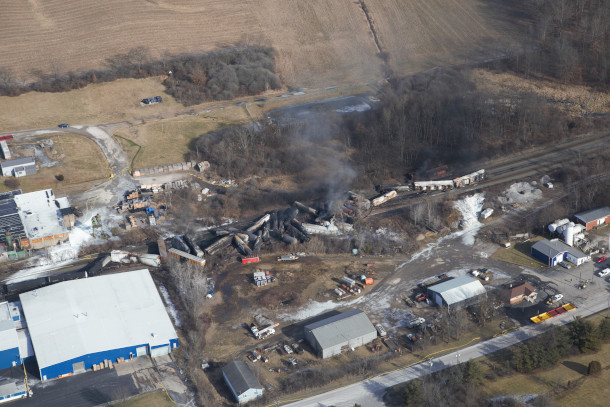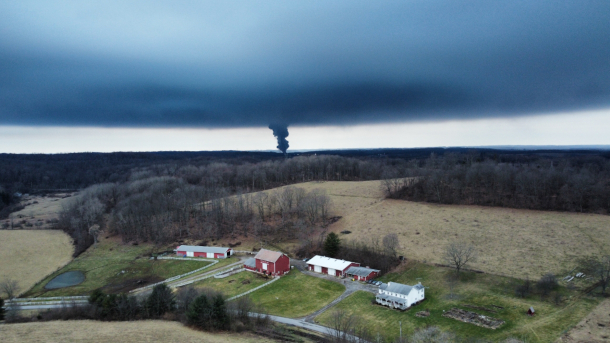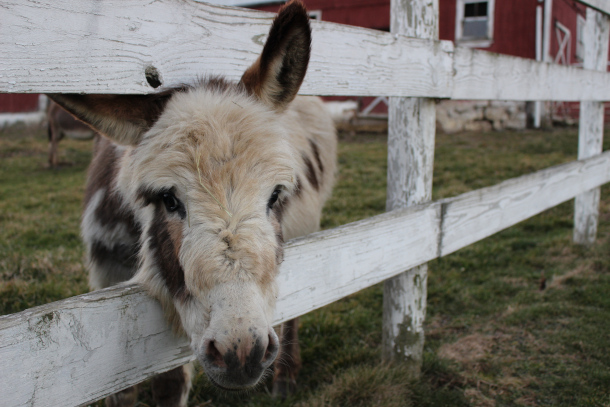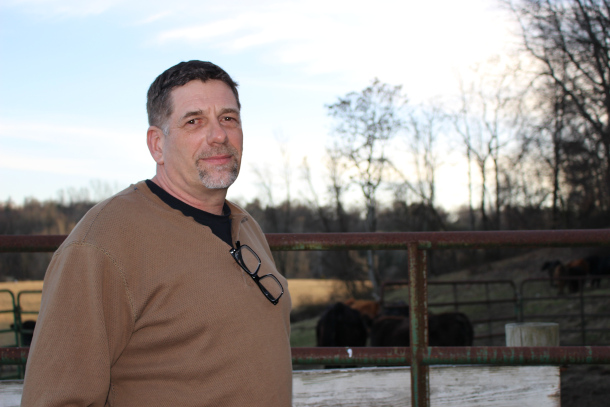Dioxin Concerns After Train Crash
Air Date: Week of March 3, 2023

An image from drone video taken on February 5, 2023 of the Norfolk Southern train derailment near East Palestine, Ohio. (Photo: National Transportation Safety Board, Wikimedia Commons, Public Domain)
The train derailment in East Palestine, Ohio last month led to a controlled release and burn of vinyl chloride, which can produce the neurotoxin dioxin. Julie Grant, a reporter for Allegheny Front, joins Host Bobby Bascomb to discuss local concern about the potential dangers of dioxin contamination in their communities.
Transcript
DOERING: From PRX and the Jennifer and Ted Stanley Studios at the University of Massachusetts, Boston, this is Living on Earth. I’m Jenni Doering.
BASCOMB: And I’m Bobby Bascomb.
The Norfolk Southern train derailment in East Palestine, Ohio last month released a cocktail of toxic chemicals include vinyl chloride and benzene into the local environment. The spill contaminated the soil and surrounding waterways, and an estimated 40,000 fish have died as a result. And now scientists and local residents are raising the alarm about a new concern- soot that may contain dioxin. To avoid an explosion, Norfolk Southern did a controlled release and burn of some vinyl chloride but heating the chemical can change its chemistry to create dioxin, a neurotoxin used in Agent Orange during the Vietnam War. Soot that may contain dioxin has settled on homes and farmland for miles around the disaster site, raising concerns for the health of the people and farm animals that were exposed. EPA initially said it would not test for dioxins, saying they didn’t have baseline data to make an accurate comparison to levels before the accident. But the agency recently changed course and has now directed Norfolk Southern to begin testing for dioxins and will compare findings to dioxin levels outside the area affected by the accident. Reporter Julie Grant has been covering the story for Allegheny Front and joins me now for more. Julie Welcome to Living on Earth!
GRANT: Hi, thanks.
BASCOMB: What are the concerns for both people and animals exposed to this soot that potentially contains dioxin?
GRANT: Dioxins are ubiquitous and exist in the environment at low levels. We're breathing them in all the time. But at higher levels, they can be toxic, they interfere with hormones can cause cancer, damage the immune system cause reproductive and developmental problems. That's all coming straight from the Environmental Protection Agency.
BASCOMB: Well, you open your recent story in the Allegheny front with David Anderson, a local farmer, can you tell us about him, please and what he went through?

A drone image above David Anderson's farm in Beaver County, Pa., 4.2 miles from the East Palestine, Ohio, train derailment, on February 6, 2023, when Norfolk Southern did a controlled release and burn of vinyl chloride from some of the wrecked train cars. (Photo: Courtesy of David Anderson)
GRANT: Yeah, so David and Elaine Anderson, this was kind of their dream home. She wanted to live somewhere that was like the Waltons, she said and so they've created this and what they call Echo Valley Farm, because it's this small valley, about 4.2 miles from the site of the train derailment. They have seven children, a few of them are adults now, but they all still gather at the farm a lot. And about 100 animals, they said 25 cows, that cattle I guess that they grow for. He called it an Angus cross it's Angus cattle crossed with another kind and they sell those for meat. They also have chickens that they raise for eggs for their own family and meats, but they also sell those. And you know, it's just a lovely spot. They have many ducks, they have three adorable donkeys that are super friendly and three dogs. And you know, like everyone else, when they heard that East Palestine was being evacuated mandatory evacuation they were on watch that this vinyl chloride was about to be burned, people were paying attention. He's a retired Air Traffic Controller and what he called himself a wind nerd and he sent up his drone. He's watching very closely the winds to see if they would be safe at the farm. He sent up a drone and saw this huge cloud. You can see some of these kinds of photos online. It's just this big dark cloud in the sky and it kind of looks like it's spreading all around the region. And they went in to eat dinner, and from what Elaine said, she said, Gosh, the mustard is so spicy, wonder why. And then, after dinner, one of their sons went outside to get water or something and was like, oh my gosh, the air is smells so bad out here and when they walked outside, they immediately knew what was what was going on. How Dave Anderson explained it was you know, our eyes were burning, our tongues were burning. We realized he said, look, we gotta go and they all just got in the car, they had to leave the animals drove seven miles north to where his oldest daughter who's pregnant lives. And then when they came back to the farm a few days later, I mean he came back to feed the animals, but when the whole family came back a few days later, that's when they found the soot on things and started worrying about how that was going to affect the animals and their ability to grow a garden and their ability to sell the meat from their animals, that kind of thing.
USEPA ordered Norfolk Southern to test for dioxins in the area of the train derailment after pressure from the community. https://t.co/Ix9Qd2Zzys
— The Allegheny Front (@AlleghenyFront) March 2, 2023
BASCOMB: And dioxins, from what I understand can bioaccumulate in animals, so a cow that was exposed today axon might actually be a risk for people that could eat that beef later on, and even eggs from chickens that were exposed. Can you tell us more about that?
GRANT: Yeah, so I talked with Murray McBride. He's an environmental toxicologist at Cornell University he's a professor emeritus there. He thinks that the animals would be less likely to have breathe this in. The bigger concern, he says is this sort of surface contamination and, you know, once it rains, that goes into the ground. So for like a free range chicken that's out pecking and getting its food from the ground, that can be really dangerous if there is dioxin in the soil they can take that in. From my understanding, dioxins attach to fat, and so it would attach to the fat of the animal and thus would show up in chickens eggs, it would show up in the meat if people were eating those chickens. And that same idea that dioxin attaches to fat also means that it can wind up in milk, it can wind up in butter. Interestingly, from what Professor McBride said, well, it's in the ground, new plants that are growing up from that ground don't actually uptake the dioxin. So new grass in the spring, even if the soils in East Palestine in that area are contaminated the new grass, you know, would not grow with dioxin in it. So cows could graze that grass and not necessarily take up dioxin, even if there's dioxin in the soil. Now, you know, there is a caveat there, which is if it's dry cows can kick up the soil And if it's contaminated, the dust from the soil can get on the grass and then if they're eating that grass, they can still get contaminated. But there is at least some modicum of good news there that new plants could grow and be clean.

One of the donkeys that was left behind when the family evacuated, shown here on February 15, 2023. (Photo: Julie Grant, The Allegheny Front)
BASCOMB: And as you mentioned, the plants that grow there aren't necessarily going to uptake you know, some of these toxins, the dioxin, for example, but from what I understand some vegetables that we might grow are more concerning than others. Can you tell us about that?
GRANT: Yeah, the way Professor McBride described this, to me was like, you could grow tomatoes those grow above ground and those should be safe and those would be fine even if the soil is contaminated with dioxin. Something like lettuce that's growing close to the ground, he might be more careful. He said, definitely, I would wash it but it might be hard to get that all off if the ground was contaminated. And he said, I definitely would not be growing a root vegetable like carrots or something that's kind of surrounded by the soil because if there was dioxin in the soil, it's there growing in that problematic environment.
BASCOMB: Well, let's shift gears a little bit and talk about another story that you've been reporting on and that's disposing of the water and the firefighting foam that was used to put out the fire after the initial burn of the vinyl chloride. From what I understand there's only a handful of facilities that can accept this sort of toxic waste, especially from out of state. How are the communities around those areas responding?

David Anderson, standing near his cattle on February 15, 2023, says he wants to know if his beef is safe to eat. (Photo: Julie Grant, The Allegheny Front)
GRANT: So from my understanding, some of the waste was sent to Texas and some of the waste was sent to a facility in Michigan, and public officials in those communities expressed that they were not aware that this was coming, and we're not happy about it. Some of the waste from Michigan actually turned around and came back to Ohio. More recently, the regulators have said they have identified facilities closer three in Ohio and one in Indiana that will accept this waste. But anyone who's in one of these communities, for example, in Northwestern Ohio, where some of the liquid waste, I think is going and will be pumped into an underground injection well. Now that injection well, I'm not sure what they're taking, but there are plenty of class two injection wells around Ohio, lots and lots of them that are taking waste from fracking that's done in the area for natural gas and a lot of that is radioactive, and it's being sent into underground injection wells that are somewhat similar to this one. And we don't hear people all up in arms about that because nobody's paying attention most of the time. Here and there people pay attention. But now this is putting attention on this issue, like we're creating all this waste, where are we putting it?
BASCOMB: Julie Grant is a reporter with the Allegheny Front. Julie, thanks so much for your time today.
GRANT: You're welcome. Thanks for having me.
Links
Read more of Julie Grant’s stories for Allegheny Front
The Washington Post | “EPA Orders Testing for Highly Toxic Dioxins at Ohio Derailment Site”
EPA | “EPA Requires Norfolk Southern to Sample for Dioxins in East Palestine”
Review EPA’s Soil Sampling data
EPA "EPA Requires Norfolk Southern to Sample for Dioxins in East Palestine"
Living on Earth wants to hear from you!
Living on Earth
62 Calef Highway, Suite 212
Lee, NH 03861
Telephone: 617-287-4121
E-mail: comments@loe.org
Newsletter [Click here]
Donate to Living on Earth!
Living on Earth is an independent media program and relies entirely on contributions from listeners and institutions supporting public service. Please donate now to preserve an independent environmental voice.
NewsletterLiving on Earth offers a weekly delivery of the show's rundown to your mailbox. Sign up for our newsletter today!
 Sailors For The Sea: Be the change you want to sea.
Sailors For The Sea: Be the change you want to sea.
 The Grantham Foundation for the Protection of the Environment: Committed to protecting and improving the health of the global environment.
The Grantham Foundation for the Protection of the Environment: Committed to protecting and improving the health of the global environment.
 Contribute to Living on Earth and receive, as our gift to you, an archival print of one of Mark Seth Lender's extraordinary wildlife photographs. Follow the link to see Mark's current collection of photographs.
Contribute to Living on Earth and receive, as our gift to you, an archival print of one of Mark Seth Lender's extraordinary wildlife photographs. Follow the link to see Mark's current collection of photographs.
 Buy a signed copy of Mark Seth Lender's book Smeagull the Seagull & support Living on Earth
Buy a signed copy of Mark Seth Lender's book Smeagull the Seagull & support Living on Earth

